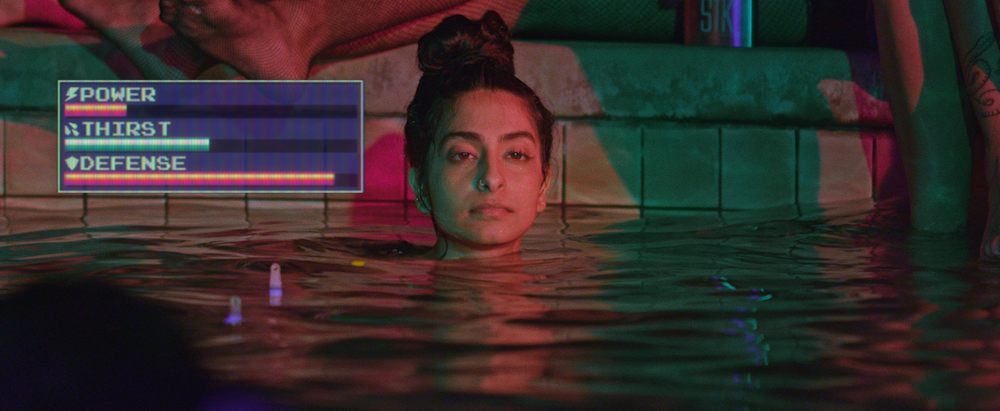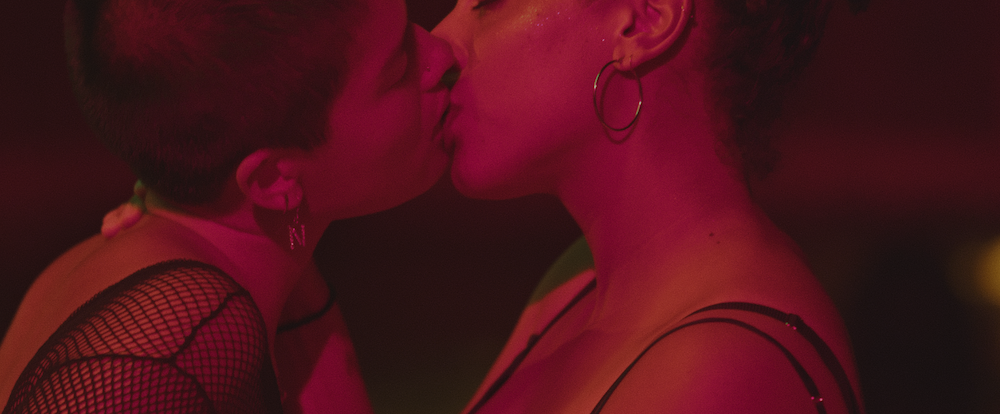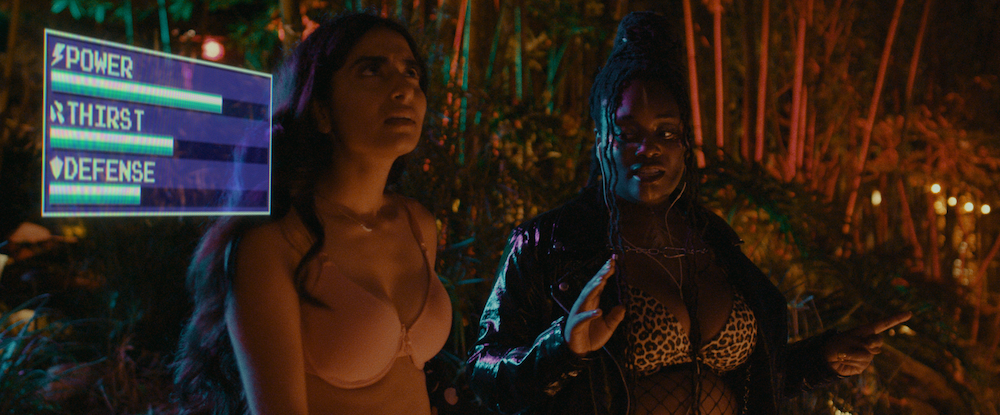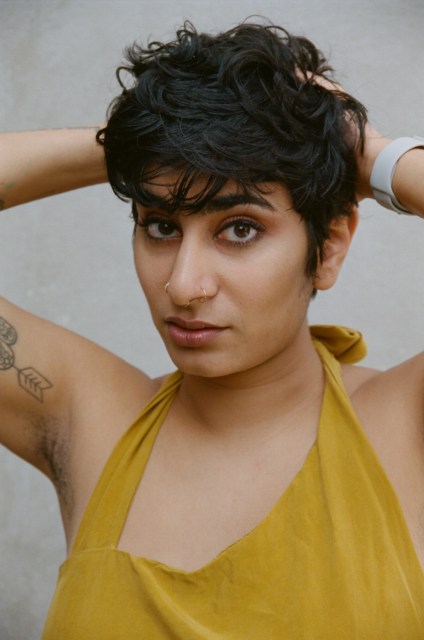I know some of you have been out there Zoom clubbing in inventive outfits and brilliantly curated backgrounds, but I have to admit that I’d personally forgotten about those little tingly jolts of excitement that shoot through my body when I get dressed to impress, go out and walk into a well-lit party full of beautiful Black and brown queers. I got a quick reminder of that feeling upon watching Fatimah Asghar’s new short film Got Game, which takes place at a luscious-looking LA pool party — even if the protagonist, Khudejha, is not exactly feeling herself.
If you’ve ever had the experience of going into a party with high expectations, and then end up warding off the unwanted and seemingly putting-off the desirable, all while trying to ignore the rising, undeniable sense that it must be you, because everyone else is having a really good, sexy, kinky time — well, friends, this is the surprisingly good-humored short for you.
Got Game is produced by Hidden Pool Productions and VAM STUDIO, and is the latest creation from Asghar, a writer and filmmaker, who you should know as the co-creator of the series Brown Girls, author of the book If They Come For Us and co-editor of Halal If You Hear Me — among other things, including an elegantly thirsty Instagram account. When I asked her to introduce herself like she would at a party, Asghar laughed and replied, “Hi, I’m Fati. Yeah.”
Before I go any further, I’m gonna pause here and tell you to watch Got Game, so you can have your own picture of what Asghar and I go on to discuss:
GOT GAME? (Short Film) from HDDN POOL on Vimeo.
I asked Asghar to talk to me about what inspired the short. “I made the film after I’d been in a relationship for a long time and I was having that moment where you’re like, ‘Man, I don’t know how to do this, I don’t really know how to date and connect with people out here.’ And particularly I was thinking about the play party and kink party scenes, and queer hook-up culture. The protagonist goes on this journey, having this pressure to be like, ‘Who am i gonna fuck?’ And in the end, actually that’s not important. What is important is a genuine intimate connection.”

For Khudejha, our protagonist, genuine connection seems hard to come by at this party, which is something that filled me, as a viewer, with great discomfort, but also familiarity. I thought back (way back, now) to what I love about gatherings, and, it is always, the hope that from the unknown, some unexpected kind of connection will emerge. When Asghar talks about what she means to play with in the concept of a game, it’s clearly about subverting the narrative we carry into so many aspects of our lives: that winning is about going in knowing what you want, and then getting exactly that. Of her protagonist, Asghar says, “She thinks she wants a certain kind of connection, and that if she doesn’t do that, if she doesn’t have sex, she’s failed at this party. But she doesn’t actually want to fuck anyone at this party. And it turns out holding this girl’s hand was the most meaningful, genuine connection of the night.”
When we’re talking about game though, we’re also talking about smooth moves, suave lines, things that we assume make people good at getting laid, but don’t necessarily foster connection. “Me and my friends will joke a lot about how hard it is have queer game,” Asghar adds. “It’s like, ‘Hey I’m trying to get at you and I don’t really know how to say that, and so what you’re gonna get is all this awkward nervous energy.’ It’s so delightful to watch Khudejha trying to get at the first girl, and she becomes that person at the party you don’t want to be around — that is such a true thing, not really knowing how to approach! You know, all the odds are in your favor and it’s clear why everyone is there, and still, you don’t have a blueprint so you fuck it up!”

In so many ways this feels like the essence of being queer, and nothing excites me more than distilling queerness through a party. We do see that whatever well-laid plans other queers have made, they aren’t going to work for Khudejha. “She’s at her lowest moment when she meets this crush at the end,” Asghar continues. “And presumably the other girl has been having a shitty night too. But that’s what brings them together. It throws into question the idea of failure, of what it means when you get rid of the rules entirely. We’re not mimicking straight relationships, we’re carving our own path in uncharted territory. We all love differently. I’ve been watching Celine Sciamama’s Portrait Of A Lady On Fire, and thinking about the question, ‘Do all lovers feel like they’re inventing something?’ You can’t have a rulebook or a playbook for how to connect. When you’re queer, it’s about negotiating your own way, when the blueprint doesn’t work for you.”
I’d say making her own blueprint is one of Asghar’s major talents. The popularity and success of her series Brown Girls is so much about the fact that it is rooted in her life, and follows two young women, one Black, one queer and South Asian, in Chicago, IL through their world. One of the main things I personally stand for as an editor and a writer, is the deep importance of portraying the regular, daily lives that queer folks of color lead — in their total and universal mundanity, which is not to say boring, but is to say unremarkable. It’s what’s always drawn me to Asghar’s work: it feels like an intra-community conversation, a reflective inside joke. It was, for example, important for Asghar to feature Natasha, a really confident, Black character, in the kind of sexually powerful role that usually only goes to skinny, white, butch people.

Asghar is very conscious about creating work that speaks to her and her friends, and even the way she conducts a shoot, including the set of Got Game, is about reflecting the values of the people who participate in her work and share her community. “I’m a very mediocre person,” Asghar says, when I ask her if she always knew that her life was worth making art about. “I’m not very good at a lot of things, and I’m kinda bobo, and I think it’s important to see mediocre characters doing mediocre things. The only representation that we see of [queer POC folks] are people who had to be extremely amazing and exceptional or people who were villains. There was never really an in-between, people who just got to be and didn’t have to justify themselves. It’s important to just be me.”

Fatimah Asghar by Valentina von Klencke
So what can you look for next from this mediocre artist being herself? Asghar is currently working on a novel for One World, Random House that will be out in the next couple years. On what it contains: “It’s very poetic and very sad. It’s about childhood and a set of siblings coming into queerness, it’s a lot about sexuality and gender.” I look forward to seeing what element of queer life she’ll illuminate next.



this was such a nice glimpse into the fun queer life i miss and look forward to seeing again!
ugh, SAME!!
This short is so relatable lol
Lol right??
this was so good!! I loved Brown Girls and her interview w VS poetry (thanks Dani Janae for the recommendation).
Her book sounds awesome..I can’t wait to read it.
Thank you for the interview!
Yeah, that VS podcast discussion is amazing! Glad you liked this, and also excited for future Fatimah work!!
I enjoyed this short and this interview!
Thaaank you!
Will captions be added to the film to make it accessible to viewers like me? Thank you.
PLEASE THIS SHORT IS SO CUTE!!!
Breeding and Strategical games are everyone’s favorite as we all love the Talking Tom Cat breeding game and as well as the Clash Of Clans which is the most prominent Android strategical game https://apkmodget.com/games/monster-legends-mod-apk/
The only representation that we see of [queer POC folks] are people who had to be extremely amazing and exceptional or people who were villains. There was never really an in-between, people who just got to be and didn’t have to justify themselves. It’s important to just be me
The only representation that we see of [queer POC folks] are people who had to be extremely amazing and exceptional or people who were villains. There was never really an in-between, people who just got to be and didn’t have to justify themselves. It’s important to just be me
On what it contains: “It’s very poetic and very sad. It’s about childhood and a set of siblings coming into queerness, it’s a lot about sexuality and gender.” I look forward to seeing what element of queer life she’ll illuminate next.
Anxiety is pretty bad and one way to suppress it is by playing interesting games. I do play monster legend to deal with my anxiety. https://theladmods.com/monster-legends-mod-apk/